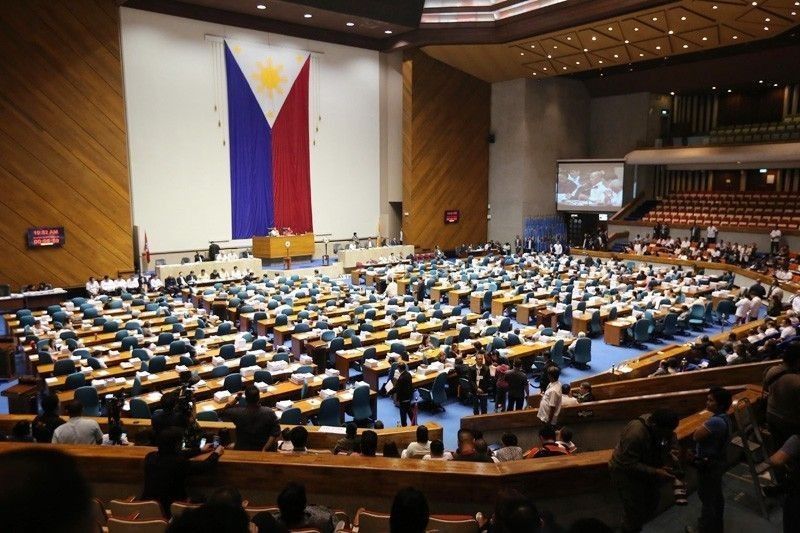House to send Duterte advance copy of 2020 budget

MANILA, Philippines — The House of Representatives is sending today an advance copy of the proposed P4.1-trillion 2020 national budget to President Duterte, his staff and the Department of Budget and Management to give them longer time to study it.
The House is transmitting the advance copy while it is printing the budget, which consists of three two-inch-thick volumes.
Over the weekend, Speaker Alan Peter Cayetano, Senate President Vicente Sotto III and the secretaries of both chambers of Congress signed the copy for the President.
Cayetano and Majority Leader Martin Romualdez have assured Duterte that the approved budget “does not contain pork or parked funds and is fully transparent.”
Sotto said Duterte is expected to sign the proposed budget into law on Jan. 6. The original schedule was before yearend, but there was a slight printing delay due to the Christmas holidays, he said.
He said the Senate would not formalize its comments on alleged pork barrel fund insertions because he and Sen. Panfilo Lacson have already discussed their concerns with Executive Secretary Salvador Medialdea and Budget Secretary Wendel Avisado.
“The President knows… we have an understanding,” Sotto said without elaborating.
Davao City Rep. Isidro Ungab, who chairs the House appropriations committee, said the President could easily spot a pork barrel appropriation.
Ungab, who headed the Davao City council appropriations panel when Duterte was city mayor, said, “I don’t want to comment any further because the next step will be with the Office of the President. The ball will soon be in their hands.”
Deputy Speaker Mikee Romero, who is an economist, said a slight adjustment in the signing of the 2020 budget would not affect the economy.
“This is unlike the delay in the enactment of the 2019 spending program, which really took its toll on the economy. The economy lost at least P500 billion a month, resulting in a slowdown in the first two quarters before it recovered in the third quarter,” he said.
Romero, who represents party-list group 1-Pacman, said the signing of the budget for 2020 next month would enable the administration to sustain economic growth.
President Duterte signed the 2019 outlay in April after vetoing or deleting P95 billion worth of pork barrel fund realignments made by the House.
Romero said the January-to-March delay actually extended to at least six months due to the tedious process of releasing funds and obligating them.
“It was longer if we include the time needed for procurement of goods and services. We want to avoid all of that next year,” he said.
Officials involved in the preparations for the recently concluded Southeast Asian Games have blamed the late release of funds for many of the problems they faced.
A few days before the Games opened on Nov. 30, workers were still sprucing up some of the event venues.
900 bills processed
The leadership of the House of Representatives, meanwhile, processed a total of 900 measures since the 18th Congress convened on July 22, churning out an average of 28 bills per day during the entire 32 session days.
“In just 32 session days, we were able to steer the approval of 175 legislative measures,” Romualdez said, noting that the chamber received a total of 6,562 measures and 186 committee reports.
Of these, the Leyte congressman said 5,889 are bills and 673 House resolutions.
Among the highlights and key priority measures that form part of President Duterte’s legislative agenda is the swift approval of the P4.1-trillion national budget for 2020 and the so-called “sin taxes” that have been ratified by the House and the Senate.
Both measures are now awaiting approval and signature by Duterte before the year ends.
Bills that have been approved on third and final reading were those amending the Foreign Investment Act of 1991, the Passive Income and Financial Intermediary Taxation Act, and the Corporate Income Tax and Incentive Rationalization Act.
These bills are important parcels of the Comprehensive Tax Reform Program that is required to help reach the ‘A’ Credit Rating goal of the Duterte administration, which has ventured into the projected P8-trillion massive infrastructure projects beyond 2022.
“I also credit the congressmen’s work ethic for the swift passage in the House of tax reform measures needed to propel the country’s economic takeoff,” Romualdez, a lawyer-banker, said.
Other key measures include the House’s approval of the bill institutionalizing the Malasakit Centers across the country and the postponement of the barangay and SK elections – both of which have already been signed into law by Duterte.
The Malasakit Centers Act, whose proponent was Sen. Christopher Go, seeks to establish a one-stop-shop in every government hospital where poor patients can seek financial assistance for their medical needs from four government agencies.
Other priority measures included House Bill 1026, which seeks to increase the tax on electronic cigarettes and impose higher duties on alcohol or the Package 2 Plus B of the Comprehensive Tax Reform Program.
This e-cigarette bill aims to amend Sections 141, 142 and 143 of Republic Act 8424, as amended, or the National Internal Revenue Code of 1997.
Romualdez also lauded both the majority and the minority’s “tough work ethic in doing their jobs creditably.”
- Latest
- Trending



























